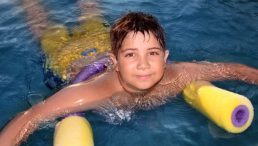
At Springbrook, our occupational and recreational therapists include some type of aquatic therapy for children with autism every single day—because the benefits are enormous and because it’s an enjoyable activity that the kids love and look forward to. It helps that there is a full size, heated indoor pool at Springbrook. So, this activity is enjoyed year round. Almost all children have a natural affinity for, and fascination with, water. This fact is even more true for children with autism.
Being submerged in water provides calming support, pressure, and buoyancy that helps kids on the autism spectrum develop their sensory processing skills, reach new physical milestones, and strengthen their social skills and self-regulation abilities.
Sensory Processing Benefits of Aquatic Therapy
Most children with autism also experience a mild to severe sensory integration disorder, or the inability to effectively take in, organize, and respond to sensory input. In fact, sensory processing deficits are one of the main triggers behind the inappropriate, anti-social, or self-destructive behaviors that are often associated with autism spectrum disorder.
Occupational therapists seek to minimize these sensory issues through sensory modulations. Sensory therapies usually refers to activities, such as swinging, jumping, touching different textures, or trying new foods that stimulate the senses. It also refers to external supports, such as weighted blankets, pressure vests, and full-spectrum lighting, that help children with autism better cope with sensory deficits. It is necessary to help children with autism thrive.
Interestingly, aquatic therapy help with sensory modulation. In other words, aquatic therapy includes activities meant to help children with autism strengthen their sensory processing skills, while the water itself is a sensory modulation—and an ideally safe and supportive environment for trying new skills. Water, particularly warm water, provides children with autism with three kinds of sensory support:
Hydrostatic pressure
Children with autism are known to crave deep pressure. Water provides this through hydrostatic pressure, or the pressure that a liquid exerts when it’s at rest. Water exerts 30x more deep pressure stimulation on the body than air. More importantly, unlike pressure vests or weighted blankets, water completely surrounds and envelopes the child’s body, perfectly distributing an equal and consistent amount of pressure on all submerged parts of the body. The result is an especially calming environment that soothes children with autism, helps them organize other sensory inputs, and gives them more confidence to try new movements.
Vestibular stimulation
Some of the obsessive, repetitive behaviors that children with autism exhibit, such as rocking and twirling, are directly related to an underdeveloped vestibular system. Children with autism usually engage in these activities because they are trying, by external measures, to develop a sense of balance. Unfortunately, these maladaptive modulations are also distracting and, too often, self-destructive. By contrast, moving around in water creates a controlled vestibular situation that is safe and more effective than other methods.
Proprioceptive feedback
Aquatic therapy for children with autism includes activities specifically designed to provide proprioceptive feedback. Proprioception, also known as your sixth sense, is your body’s ability to understand where it is in space—which is an ability that develops later in childhood, explaining why babies need to be held and why toddlers’ movements are erratic. For children with autism, this sense is usually underdeveloped, making them seem clumsy or strange in their movements. In water, the resistance children encounter when they move, the feel of water rushing past them, and the hydrostatic pressure when they are still all combine to give enhanced proprioceptive feedback and improve this sense.
After an aquatic therapy session, occupational therapists often report better moods, better focusing abilities, and better sensory processing abilities. The enhanced sensory input that children with autism receive in water helps them develop body awareness, gain greater touch tolerance, and improve their ability to coordinate all of the different sensory inputs received from the environment and focus on the correct one.
Physical Benefits of Aquatic Therapy
In addition to all of the sensory processing benefits, aquatic therapy also helps children with autism develop physically. Of course, any type of exercise is beneficial, but moving in water works more muscles simultaneously than any other exercise! Water exercise not only strengthens all muscles, including the heart, it also improves coordination, range of motion, balance, and endurance—all skills that tend to be underdeveloped in children with autism.
More importantly, being in water makes the body more lighter and more buoyant, and reduces the fear of injury, making children with autism feel more confident trying new movements that they might never try on land. This confidence, in turn, gives them an increased sense of mastery and accomplishment, usually through the use of play-based, functional movements.
Finally, working in water can enhance core strength, reduce pain and stress on the joints and soft tissues, improve motor planning and fine motor skills, strengthen oral motor skills (such as blowing out candles or drinking through a straw), and increase breathing control.
Social and Behavioral Benefits of Aquatic Therapy
On top of all of the other benefits of aquatic therapy, being in the water is just plain fun. After a successful session, many occupational therapists report that children with autism are more talkative and social, better able to cooperate—and more interested in imaginative and group play.
The calming effects of being in water tend to last well past the initial session. Psychologically, hydrotherapy often results in better moods, better impulse control, improved self-esteem and body image, decreased anxiety, and a marked drop in problem behaviors.
Our occupational therapists use all methods at our disposal to help your child achieve success, and even thrive.
To find out more about the residential therapies and treatments for autism that we offer or to schedule a private consultation, call our offices at 864.834.8013.